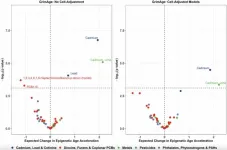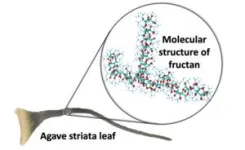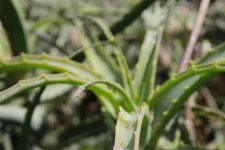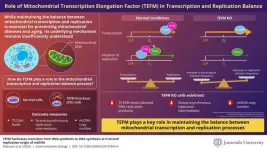(Press-News.org)
“Environmental chemical exposures represent a key modifiable risk factor impacting human health and longevity, and our findings provide evidence for associations between several environmental exposures and epigenetic aging in a large sample representative of the US adult population.”
BUFFALO, NY — March 5, 2025 — A new research paper was published in Aging (Aging-US) on February 11, 2025, Volume 17, Issue 2, titled “Exposome-wide association study of environmental chemical exposures and epigenetic aging in the national health and nutrition examination survey.”
First author Dennis Khodasevich and corresponding author Andres Cardenas from Stanford University, and colleagues from other U.S. institutions, studied how exposure to harmful chemicals in the environment affects aging. Using data from the National Health and Nutrition Examination Survey (NHANES), they discovered that cadmium, lead, and cotinine are linked to faster biological aging, a process that can increase the risk of age-related diseases.
The study analyzed data from 2,346 U.S. adults aged 50 to 84 who participated in a national health survey. Researchers tested their blood and urine for 64 different chemicals, including metals, pesticides, and industrial pollutants. They assessed how these exposures influenced eight different epigenetic aging markers—biological clocks that measure how fast a person’s body is aging at the DNA level.
“We harnessed data from the National Health and Nutrition Examination Survey 1999-2000 and 2001-2002 cycles to examine exposome-wide associations between environmental exposures and epigenetic aging.”
The strongest effects were linked to cadmium, a toxic metal found in cigarette smoke and some foods. People with higher levels of cadmium in their blood showed signs of accelerated aging. Higher levels of cotinine, a chemical related to tobacco exposure, were also linked to increased biological age, reinforcing the harmful effects of smoking. Additionally, lead exposure, a heavy metal found in old paint and contaminated water, was also associated with faster aging.
The researchers also found that some pollutants, including a type of PCB (PCB118) and a type of dioxin (HpCDD), were linked to slower biological aging. However, it is unclear if this fact is beneficial, as past research shows that slower aging in some cases can still be linked to health risks.
This study is one of the largest to investigate how pollution affects the aging process. Unlike previous research that focused on only a few chemicals, it examined a wide range of pollutants in a diverse group of people. The findings suggest that everyday exposure to toxic substances can speed up aging at the cellular level, increasing the risk of age-related diseases.
In summary, these findings raise concerns about how widespread environmental contaminants may accelerate aging and contribute to chronic diseases such as heart disease, cancer, and cognitive decline. Reducing exposure to toxic substances like cadmium and lead—found in cigarettes, polluted air, and contaminated food—could help slow biological aging and improve long-term health. These insights highlight the need for stronger environmental health policies to protect individuals from premature aging and disease.
Read the full paper: DOI: https://doi.org/10.18632/aging.206201
Corresponding author: Andres Cardenas — andresca@stanford.edu
Keywords: aging, epigenetic aging, environmental exposures, exposome, epigenetics
Click here to sign up for free Altmetric alerts about this article.
About Aging:
The journal Aging aims to promote 1) treatment of age-related diseases by slowing down aging, 2) validation of anti-aging drugs by treating age-related diseases, and 3) prevention of cancer by inhibiting aging. (Cancer and COVID-19 are age-related diseases.)
Aging is indexed by PubMed/Medline (abbreviated as “Aging (Albany NY)”), PubMed Central, Web of Science: Science Citation Index Expanded (abbreviated as “Aging‐US” and listed in the Cell Biology and Geriatrics & Gerontology categories), Scopus (abbreviated as “Aging” and listed in the Cell Biology and Aging categories), Biological Abstracts, BIOSIS Previews, EMBASE, META (Chan Zuckerberg Initiative) (2018-2022), and Dimensions (Digital Science).
Please visit our website at www.Aging-US.com and connect with us:
Facebook
X
Instagram
YouTube
LinkedIn
Reddit
Pinterest
Spotify, and available wherever you listen to podcasts
Click here to subscribe to Aging publication updates.
For media inquiries, please contact media@impactjournals.com.
Aging (Aging-US) Journal Office
6666 E. Quaker St., Suite 1
Orchard Park, NY 14127
Phone: 1-800-922-0957, option 1
END
Jerome E. Morris, the E. Desmond Lee Endowed Professor of Urban Education at the University of Missouri–St. Louis, has been voted president-elect of the American Educational Research Association (AERA). Morris joins the AERA Council in 2025–2026 as president-elect, and his presidency begins at the conclusion of the association’s 2026 Annual Meeting.
Morris leverages his upbringing in public housing and attending predominantly Black public schools in Birmingham, Alabama, to inform his research, which examines the intersection of ...
WASHINGTON — Agave plants may be best known for their role in tequila production, but they are also remarkably adept at retaining water in extremely dry environments. In a new study, researchers used terahertz spectroscopy and imaging to gain new insights into how these succulents store and manage water to survive in dry conditions.
“Understanding how plants adapt to dry conditions could lead to better farming practices and be used to develop crops that require less water,” said Monica Ortiz-Martinez ...
The Aligning Science Across Parkinson’s (ASAP) initiative opened applications for research community members to apply for funding to develop novel tools to advance Parkinson’s disease (PD) research. The Collaborative Research Network (CRN) 2025 Technical Track grants will support the development of sustainable tools to accelerate validation and therapeutic research and discovery for emerging targets identified through ASAP discoveries, offering funding of up to $2M per year over three years, up to $6M total.
"By bringing researchers together to generate new preclinical tools for targets studied in our ASAP programs, our goal ...
ORLANDO, Fla. – Mar. 5 2025 – New research has uncovered a potential gamechanger for improving cardiometabolic health: fresh mangos. A study recently published in the journal Nutrients finds that eating two cups of mango, just about 100 calories-worth, daily may help lower insulin concentration levels and improve insulin sensitivity in adults who are overweight or obese with chronic low-grade inflammation. The findings underscore how simple dietary choices could contribute to reducing the risk of chronic conditions like type 2 diabetes, ...
Sweden’s radioactive nuclear waste will be stored in a sealed bedrock repository for 100,000 years. It will be hazardous for a very long time. So how can we ensure that humanity does not forget that it is there? Researchers at Linköping University, Sweden, have come up with a proposal for how to keep the memory alive over generations.
“We’re trying to do something that no one has ever done before. The person who eventually reads this might not even be human, but perhaps a kind of AI or something ...
Given the growing role of mobile technology in supporting older adults, it’s essential to implement initiatives that encourage its adoption among this population. However, older adults are often unfamiliar with mobile technology, especially those in rural areas with limited digital access or literacy.
To bridge this gap, researchers from Florida Atlantic University’s Christine E. Lynn College of Nursing, and collaborators, implemented a pilot study to test an intergenerational program involving high school students, older adults and local faith-based health educators in the “Glades,” a rural community nestled at the ...
Mitochondrial deoxyribonucleic acid (mtDNA) is essential for cellular energy production and overall cell function. Abnormalities in mtDNA are linked to various diseases and are also implicated in aging. Understanding the process of replication and transcription of mtDNA is crucial for improving our knowledge of human health, disease, and aging. However, the mechanisms that regulate the balance between transcription and replication of mtDNA remain unclear.
To unveil the mechanisms, a team of researchers ...
Gliomas are types of cancers that arise in the brain and are extraordinarily difficult to treat. They are the leading cause of brain tumour-related deaths in both children and adults. Two pioneering scientists are awarded The Brain Prize 2025 for their discoveries that open up an entirely new way of thinking about and understanding these lethal diseases, and the potential strategies to treat them.
Copenhagen, Denmark, March 5th, 2025. Neuroscientists, Professors Michelle Monje (USA) and Frank Winkler (Germany), have made transformative discoveries by showing that neural ...
A team of Japanese researchers has discovered that Japan’s concrete structures—including buildings and infrastructure—absorb and store about 14% of the carbon dioxide (CO2) emissions generated during cement production.
This research provides vital knowledge to offset CO2 emissions from cement production, a significant contributor to global carbon emissions at approximately 8%. The study was published in the Journal of Cleaner Production.
With the growing urgency of climate change, scientists are focusing not only on reducing ...
ITHACA, N.Y. – Experts see peer recognition as important to student success in physics, and a new study gives college-level physics instructors insight into how students perceive the message from their classmates that “you’re good at physics.”
Even when women receive similar amounts of recognition from peers as men for excelling in physics classes, they perceive significantly less peer recognition, the researchers found. “Men are internalizing their recognition differently than women,” said Natasha Holmes, professor of physics at Cornell University.
Holmes ...









